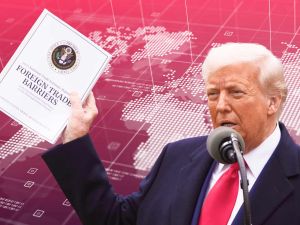It’s been an uncertain couple of weeks for financial markets, with threats of a global trade war, geopolitical risks coming into fruition, Facebook’s data breach and a more aggressive regime shift in monetary policy adding to the noise. Here, we take a look at what this means for your investments.
Financial markets are still getting used to a return to normal dynamics after an unprecedented year of low volatility in 2017. Short memories mean investors may have forgotten that volatility is actually a crucial dynamic of a healthy financial market.
The VIX, a measure of volatility on the S&P 500 index, jumped again this week on uncertainty on the global stage, but these risks aren’t necessarily new – investors have just been slow to respond to them.
Trump’s trade tirade
President Trump has certainly been busy over the last few weeks, stoking fears of a trade war, reshuffling his White House staff and preparing to veto a spending bill that could shutdown the government.
Retaliating to American tariffs on Chinese steel and aluminium imports earlier this month, China has signalled it will go head-to-head with the US by unveiling tariffs on nearly 130 US products.
The White House announced further wide-ranging tariffs on Thursday, affecting up to $60 billion of annual Chinese imports. China has since signalled that whilst it doesn’t want a trade war, it isn’t afraid of one, either.
That America is pursuing a policy of building trade barriers shouldn’t come as a surprise to anyone following US politics closely. US rhetoric has focused on trade and bilateral trade, most notably around NAFTA negotiations between the US, China, and Canada.
Financial markets and mainstream economics tend to align on the thinking that trade wars are bad news for global growth, especially if it triggers cost-based inflation.
Elsewhere in America, Trump has threatened to veto a spending bill, which will lead to a government shutdown. Now, under normal scenario, this wouldn’t usually spill into financial markets, but rising uncertainty on the global stage means that this has led to increased volatility.
This uncertainty is only exacerbated further by another changing of the guards in the White House, with the third National Security Adviser replacing HR McMasters. As new man at the helm John Bolton is known for being ultra-hawkish, this move could signal a more confrontational approach to foreign policy, which is significant against a backdrop of rising tensions with Korea and Iran.
Facebook’s data breach
On the markets, Facebook is struggling to recover from a data scandal that has not only hit its share price but drawn criticism from across the regulatory world. The US Congress has called on Mark Zuckerberg to testify over how Facebook uses the personal information of its users.
The company at the centre of the scandal, Cambridge Analytica, is accused of misusing Facebook data of around 50 million people to target them for political advertising in the US election and EU referendum. As scrutiny falls on how companies use data for digital advertising, Facebook, Google and others with similar business models have suffered as a result.
With Facebook’s advertising under scrutiny, the platform might grow a little slower and make less money than initially expected at the start of the year. Facebook’s growth has been phenomenal so far, and as a result it’s highly valued on the markets.
This means there’s little room for slip-ups, and any misgivings will be punished. Its slump on the markets this week saw it fall from trading on 30 times forward earnings to 26 over the week, although this is still higher the the S&P 500’s 22x.
What this means for Moneyfarm portfolios
Concern that recent events will lead to slower growth, higher costs and greater geopolitical risk, are being translated in the financial markets. After such a prolonged period of calm in 2017, volatility can be unnerving and make you second-guess your strategy.
Fundamentally, our view hasn’t changed and our recent rebalance has adjusted our positions to ensure they reflect our investor profiles.
We think about portfolio risk primarily, but not exclusively, in terms of volatility. We monitor model portfolio volatility on a daily basis to ensure that it stays within our expected levels. Where necessary we will adjust portfolios to manage portfolio risk. We also look at volatility over a range of time periods to evaluate how portfolios could behave in different market conditions.
What we have seen is that portfolio volatility over the past year remains slightly below targeted levels. Year-to-date, we are broadly in line with our expectations. In the past we have resisted the temptation to raise risk in portfolios in the search of a higher return. We felt that 2017 volatility was very low by historical averages and shouldn’t be extrapolated into the future.
When it comes to measuring your performance, it all depends on what your benchmark is. The UK’s blue-chip FTSE 100 index has fallen from its 2017 high, which means you could have lost up-to £1,100 had you invested £10,000 at the beginning of the year.
In times of geopolitical uncertainty, diversification can be a good way to manage the risk in a portfolio. By spreading your money across different investments, asset classes or geographies, you hope to offset any short-term fluctuations with gains made elsewhere.
This strategy doesn’t mean you’ll never see fluctuations in your performance, but it aims to soften any losses. In the Moneyfarm model portfolios, the fixed income exposure we have has cushioned some of the falls from higher risk asset classes, like equities.
Finding the right strategy for you
Regular investing, although it might seem to go against instinct, can also help maximise your returns during uncertainty. By investing a little and often, you average out the amount you pay for an asset over time.
Imagine this simple scenario: an asset costs £1,000 on day one, but after two months of extreme volatility falls 10% to £900, before recovering back to £1,000 a month later. You want to buy three units.
If you had bought three units on day one, you’d have spent £3,000 on the investment. Had you invested on a monthly basis, you’d have spent £2,900. By investing regularly, you’d have lowered the amount you would have paid for the asset rather than if you’d invested in a lump sum.
Setting up a direct debit allows you to avoid any potential harmful knee-jerk reactions and gives you the freedom to focus on the important things in life.
If you want to invest your money for financial goals that are over five years away, the financial markets may offer a good solution to protecting your money from inflation. Research from Barclays shows that 91% of Stocks and Shares ISAs outperformed their Cash ISA cousins over a ten-year period¹.
Whilst everyone looks for the elusive edge to help them grow their money on the financial markets, the most valuable thing you need is time. A longer time horizon allows you to take on more risk with your money, which means you can expect higher returns – although the value of your investments can also fall.
If you’d like to talk about your portfolio performance, or are interested setting up a direct-debit, book a call with our investment consultants.
¹Barclays Equity-Gilt Study





